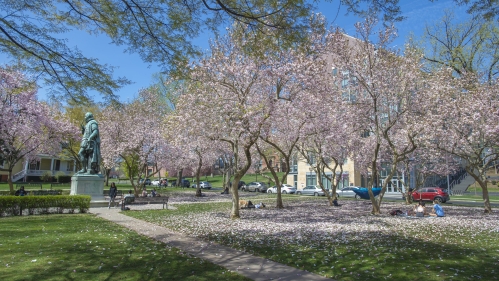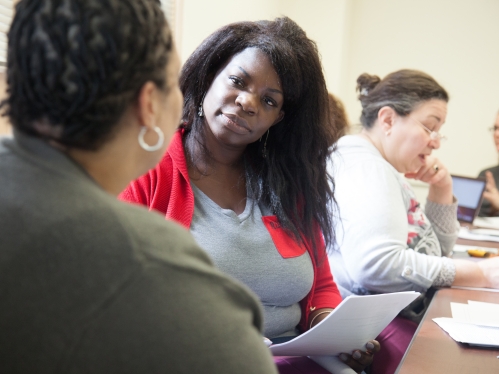DSW Curriculum & Syllabi
Rutgers DSW students will receive hands-on teacher training from Rutgers School of Social Work faculty along with regional and national practitioners.

Our DSW program transforms clinicians into social work leaders who address complex practice issues through the knowledge building and dissemination.
The mission of the Doctor of Social Work program is to transform experienced clinical social workers into scholar-practitioners who promote human well-being, attend to anti-oppressive practice and social justice, and develop skills in teaching and leadership for the social work profession. A person-in-environment perspective, incorporating micro, mezzo, and macro levels of practice, is the foundation for the DSW curriculum. Graduates’ professional identity will be grounded in the NASW Code of Ethics as they enter an increasingly diverse and global environment ready to appraise, develop, and disseminate clinical knowledge through traditional and innovative modalities
DSW Program Goals
Graduates of the DSW Program at the School of Social Work will:


Rutgers DSW students will receive hands-on teacher training from Rutgers School of Social Work faculty along with regional and national practitioners.
Learn about our current DSW students.
The DSW department is proud of all of our students' achievements. View some of our current students' many accomplishments.
Third-year students produce a dynamic, interactive multimedia project (MMP) that synthesizes their scholarship and makes their work accessible and useful to a global audience. Our graduates learn to use video, audio, data visualizations and other digital tools to advance human understanding, and to connect with and serve their chosen communities.
This fall, Rutgers School of Social Work welcomes 13 new students to its Doctor of Social Work (DSW) Program. We invite you to learn more about each student and their goals for their time at Rutgers.
By assisting you in developing the thinking and writing skills that translate your rich practice experiences into innovative case studies and qualitative papers that connect theory, research, and practice and are publishable. We give you the technical skills you will need to connect to online audiences who need access to your clinical wisdom and experience.
You were meant to be an acknowledged leader in the field of clinical social work, drawing on your experience to build knowledge through the development and dissemination of original ideas through journal articles and books, national and international conferences, and innovative websites. In the Rutgers DSW program, you will gain insight to allow you to be part of the practice world, where we need such leaders.
Each year consists of nine onsite weekend residencies and two online residencies. The onsite residency sessions will include lectures, seminars, writing workshops, case presentations, meetings with faculty and advisors, and participation in research interest groups. Each day of a residency consists of two three-hour modules; one in the morning and one in the afternoon. Our modular approach provides the flexibility for students to learn from a multitude of faculty with a broad array of expertise and allows our faculty (drawn from across various disciplines, institutions, and nations) to focus instruction on what they do and know best. Our instructors are deep thinkers from a variety of fields who have attained considerable influence in their areas, and thus serve as aspirational role models for experienced practitioner doctoral education.
Coursework is grounded in three integrated sequences: foundation (training in theory development and research skills), clinical practice (use and critique of clinical theories), and engaged scholarship (writing, clinical, and research proseminars). Graduation requires successful completion of 54 credits and is completed in three years. The program builds on students’ initial case studies which are completed in the first year. Formulating the case study helps students to develop critical thinking skills needed to draw on the scholarly literature and to understand case material in a new way. This becomes the foundation for developing qualitative inquiry skills and enhancing writing skills in the second year of the program. The final year culminates in a multi-media project that allows students to disseminate their work while also engaging with the greater scholarly community. These three projects make up a portfolio that is required for graduation in lieu of a traditional dissertation. Through the curriculum and assignments, the DSW doctoral degree prepares graduates to address complex practice issues using critical perspectives and nuance, and enables them to become more sophisticated practitioners, teachers, and consumers and creators of scholarship. Learn more about the portfolio projects→
We have designed an innovative writing-intensive curriculum that offers our students the unique opportunity to engage in guided writing and revision with experienced writing professors. Students will learn strategies for writing publishable material asthey progress through the program, and professionalize and distinguish themselves through their writing. Additionally, students will create and maintain their own professional website to be interlinked with the DSW Website as both a digital ‘home’ for continued scholarship, a venue for conversation among peers, and they will get an opportunity to practice establishing a web presence, while learning critical digital literacy skills.